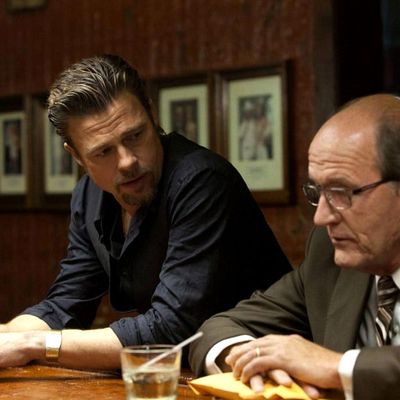
Everything in Killing Them Softly that springs from George V. Higgins’s 1974 crime novel Cogan’s Trade is very fine: grimly amusing then shockingly brutal. It’s when New Zealand–born director and screenwriter Andrew Dominik veers off course to give us his deep thoughts on the American character that it’s a head-slapper. The effect is genuinely odd. There we are, immersed in New Orleans circa the early seventies, and a TV or radio will interrupt the action with the latest from the 2008 presidential campaign and financial meltdown—we’re thrown from the movie as abruptly as James Bond pushing the button on his ejector seat. That I sympathize with Dominik’s cynical view of our professed Jeffersonian ideals and polar-opposite practices only made things worse. Hearing one’s own opinions put to foolish use can undermine them faster than the wisest counterargument.
Higgins isn’t around to protest, but I’m pretty sure he’d have groaned at Dominik’s interpolations too. Everything else is so on the money. If you’ve never read Higgins, you’ve missed the link between the pulp fiction of the fifties and the Pulp Fiction of Quentin Tarantino. Cogan’s Trade centers on a heist and its bloody aftermath, the plot distilled into a series of winding conversations — duets, mostly — about this, that, and the other thing, in which the narrative only gradually comes into focus. The slangy diction is deliberate. (Did Higgins know Pinter?) The tone is morally neutral, as befits a man who was for years a crime reporter, but you can detect a glimmer of pathos here and there for criminals who are too dim to think through the consequences of their actions and are, as a result, dispatched with Darwinian logic.
Brad Pitt plays the Darwinian dispatcher, Jackie Cogan, a master enforcer and hit man who does think through others’ consequences. He is cold but never sadistic. He sees no point in making people suffer needlessly—hence his stated desire to “kill them softly.” If nothing else, prolonging the agony is bad business, leading to victims’ “touchy-feely” pleading, cries for their mothers, etc. Cogan arrives in New Orleans at the start of the second act—unfortunately, in another example of directorial overkill, to Johnny Cash rasping “The Man Comes Around.” (“There’s a man goin’ round takin’ names, and he decides who to free and who to blame …”) Earlier, Johnny “Squirrel” Amato (Vincent Curatola, Johnny “Sack” in The Sopranos) had explained to his young accomplices, Frankie (Scoot McNairy) and Frankie’s smart-ass junkie friend Russell (Ben Mendelsohn), that they can get away with robbing a lucrative card game because the unnamed criminal overseers would blame the hotshot who runs it, Markie Trattman (Ray Liotta). It turns out that Markie had years earlier succeeded in robbing his own game—and then gleefully let it slip to his buddies once the fuss died down. Everywhere you look there is layer upon layer of idiocy.
The robbery itself is staged and acted with rivetingly precise imprecision, the two young men tugging on stockings through which their features are vaguely visible and ordering the gamblers around with extra, unsteady beats. The seasoned men at the card tables obey the thieves’ commands but with more of a shrug than a whimper. “You know they’re gonna kill ya,” says Liotta’s Markie, handing over the cash. “You sure you wanna do this?” Clearly he senses that he’s a dead man, too: The fatalism is thicker than the cigar smoke. The scene would be perfect if not for Bush on the TV explaining the financial bailout. By George, bankers steal and are reimbursed!
Best to focus on the actors. You won’t recognize McNairy from Argo, in which he’s the hostage with the mustache, the killjoy. As the luckless Frankie, his face is open, his voice high and strangled, his vibe sweet with a touch of hysteria. As his mate, Mendelsohn radiates a fascinating blend of smugness and obliviousness—a different animal than his frightening sociopath in Animal Kingdom. Actors live for this kind of tongue-in-cheek prole poetry. Besides Curatola, there’s another Sopranos boss in the movie — an amusingly sloppy, effusive James Gandolfini as an out-of-town hit man who knows he’s about to go to prison and be dumped by his wife and who drinks in a losing battle to keep despair at bay. He’s another Darwinian casualty, a write-off.
The best scenes in Killing Them Softly — the showstoppers — are the low-key, poker-faced exchanges (most in a car against a wasted urban landscape) between Cogan and Richard Jenkins as some sort of mob bureaucrat-middleman. Jenkins’s exceedingly plain, matter-of-fact delivery — he could be working at an insurance company — is the most fun kind of satire: straight up, no winking. (You can almost hear the Coen brothers holding their sides and pounding on their chairs.) Pitt goes the same way. He’s not particularly inventive — with his appraising eyes and a toothpick in his mouth, he’s like Redford without the edge — but he uses his stardom cannily, to kill with softness.
Pitt brings off Dominik’s final riff on America the Corporation, but the film doesn’t need it. It doesn’t need Obama’s hope-and-change speeches or Depression-era standards like “It’s Only a Paper Moon” on the soundtrack following the bloody hits. As in his deadly, overrated The Assassination of Jesse James by the Coward Robert Ford, he’s going the extra mile to prove he’s not to be dismissed as a “genre” director. What he proves in Killing Them Softly is that he has talent—and that he needs to be protected from his higher impulses.
This review originally appeared in the December 3 issue of New York Magazine.





